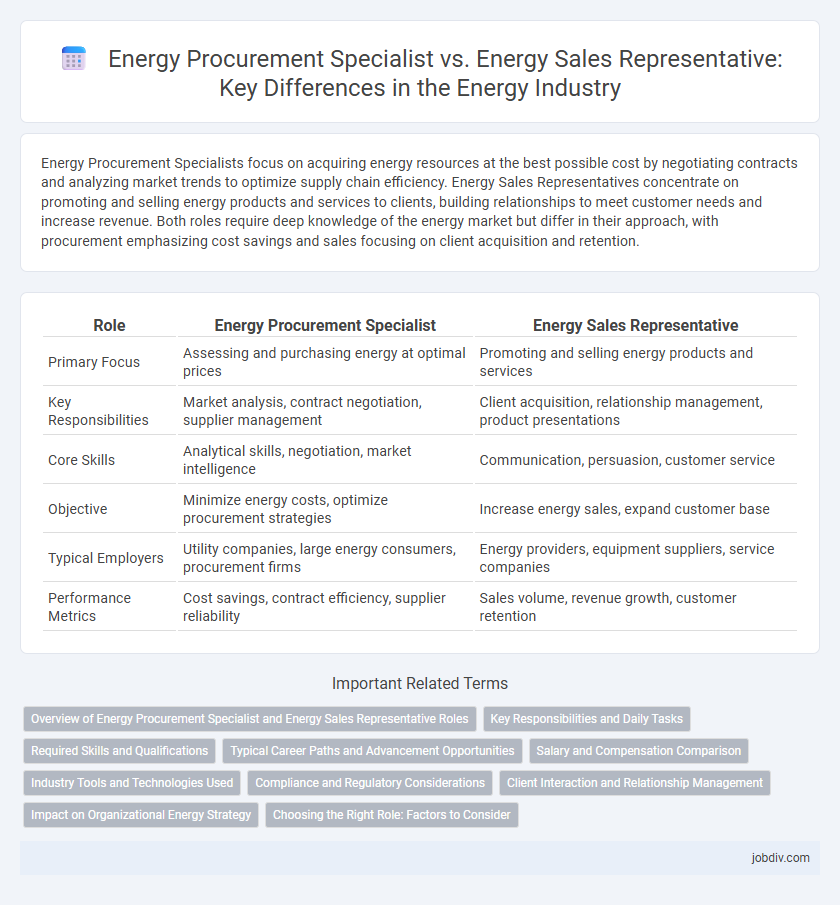Energy Procurement Specialists focus on acquiring energy resources at the best possible cost by negotiating contracts and analyzing market trends to optimize supply chain efficiency. Energy Sales Representatives concentrate on promoting and selling energy products and services to clients, building relationships to meet customer needs and increase revenue. Both roles require deep knowledge of the energy market but differ in their approach, with procurement emphasizing cost savings and sales focusing on client acquisition and retention.
Table of Comparison
| Role | Energy Procurement Specialist | Energy Sales Representative |
|---|---|---|
| Primary Focus | Assessing and purchasing energy at optimal prices | Promoting and selling energy products and services |
| Key Responsibilities | Market analysis, contract negotiation, supplier management | Client acquisition, relationship management, product presentations |
| Core Skills | Analytical skills, negotiation, market intelligence | Communication, persuasion, customer service |
| Objective | Minimize energy costs, optimize procurement strategies | Increase energy sales, expand customer base |
| Typical Employers | Utility companies, large energy consumers, procurement firms | Energy providers, equipment suppliers, service companies |
| Performance Metrics | Cost savings, contract efficiency, supplier reliability | Sales volume, revenue growth, customer retention |
Overview of Energy Procurement Specialist and Energy Sales Representative Roles
Energy Procurement Specialists focus on sourcing and purchasing energy resources at optimal costs while managing supplier relationships and contract negotiations to ensure reliable and cost-effective energy supply for organizations. Energy Sales Representatives drive revenue growth by promoting and selling energy products or services, identifying customer needs, and maintaining strong client relationships to expand market share. Both roles require industry knowledge but differ in their core objectives: procurement emphasizes supply chain efficiency and cost control, whereas sales prioritize customer acquisition and revenue generation.
Key Responsibilities and Daily Tasks
Energy Procurement Specialists manage the acquisition of energy resources by analyzing market trends, negotiating contracts, and ensuring compliance with regulatory standards to optimize cost efficiency and supply reliability. Energy Sales Representatives focus on promoting and selling energy products or services by identifying customer needs, developing strategic sales plans, and maintaining client relationships to drive revenue growth. Both roles require strong industry knowledge, but procurement centers on sourcing and contract management, while sales emphasize customer engagement and market expansion.
Required Skills and Qualifications
Energy Procurement Specialists require strong analytical skills, expertise in contract negotiation, and a deep understanding of energy markets and regulatory frameworks. Energy Sales Representatives need exceptional communication skills, customer relationship management experience, and a solid knowledge of energy products and pricing strategies. Both roles demand proficiency in market analysis software and industry-specific certifications such as CEM or CEA.
Typical Career Paths and Advancement Opportunities
Energy Procurement Specialists often advance by gaining expertise in contract negotiation, supply chain management, and market analysis, leading to roles such as Procurement Manager or Energy Risk Analyst. Energy Sales Representatives typically progress through demonstrated sales performance and client relationship management, moving into positions like Sales Manager or Business Development Director. Both career paths benefit from industry certifications and evolving knowledge of energy markets, regulatory environments, and technological innovations to enhance advancement opportunities.
Salary and Compensation Comparison
Energy Procurement Specialists typically earn a higher median salary than Energy Sales Representatives, reflecting their role in negotiating large contracts and managing supply chain efficiencies. According to industry data, Energy Procurement Specialists can expect average annual compensation ranging from $80,000 to $110,000, while Energy Sales Representatives generally earn between $60,000 and $90,000, often supplemented by commission-based incentives. Variations in total compensation are influenced by experience, region, and company size, with procurement roles emphasizing base pay and sales roles relying more on performance-based bonuses.
Industry Tools and Technologies Used
Energy Procurement Specialists utilize advanced energy management software, demand forecasting tools, and commodity trading platforms to optimize purchasing strategies and cost-efficiency. Energy Sales Representatives leverage Customer Relationship Management (CRM) systems, market analytics tools, and digital communication platforms to engage clients and tailor energy solutions. Both roles increasingly incorporate smart grid technologies and data analytics to enhance decision-making and operational effectiveness in the energy sector.
Compliance and Regulatory Considerations
Energy Procurement Specialists navigate complex regulatory frameworks to ensure compliance with local, national, and international energy procurement laws, mitigating risks of non-compliance and penalties. Energy Sales Representatives focus on understanding regulatory requirements related to energy product marketing and sales, ensuring that contracts and promotions adhere to industry standards and legal obligations. Both roles require up-to-date knowledge of energy policies, but Procurement Specialists prioritize compliance in purchasing processes, while Sales Representatives emphasize regulatory adherence in customer interactions.
Client Interaction and Relationship Management
Energy Procurement Specialists prioritize strategic client interactions by analyzing market trends and negotiating contracts to secure cost-effective energy supplies tailored to clients' operational needs. Energy Sales Representatives focus on building and maintaining client relationships through regular communication, product presentations, and addressing customer inquiries to drive energy product sales. Both roles require strong relationship management skills, but Procurement Specialists emphasize long-term contract optimization while Sales Representatives concentrate on expanding the customer base and enhancing client satisfaction.
Impact on Organizational Energy Strategy
An Energy Procurement Specialist directly influences organizational energy strategy by securing cost-effective, sustainable energy contracts that optimize supply reliability and budget management. In contrast, an Energy Sales Representative primarily drives energy consumption through customer acquisition and promoting energy solutions, indirectly shaping demand patterns. The Procurement Specialist's role is critical in aligning energy purchases with strategic sustainability goals, while the Sales Representative impacts revenue growth and market presence within the energy sector.
Choosing the Right Role: Factors to Consider
Energy Procurement Specialists focus on analyzing market trends, negotiating contracts, and securing cost-effective energy supplies for organizations, emphasizing strategic sourcing and risk management. Energy Sales Representatives prioritize building client relationships, understanding customer needs, and promoting energy products or services to drive sales growth. When choosing the right role, evaluate your strengths in negotiation and market analysis versus communication and sales skills, as well as your preference for behind-the-scenes strategy or direct client interaction.
Energy Procurement Specialist vs Energy Sales Representative Infographic

 jobdiv.com
jobdiv.com